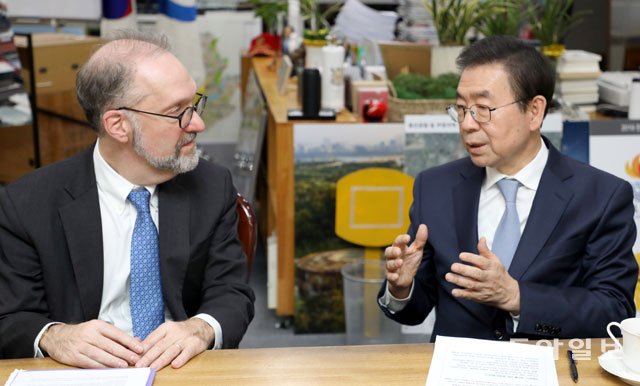Thoughts: 2018
David Weil delivers keynote at international labor forum and meets mayor of Seoul
Dec. 11, 2018

Dean Weil meeting with Seoul Mayor Won-Soon Park of Seoul. (Photo from Dinga.com)
On Dec. 11, 2018, David Weil delivered the keynote address at the Second International Forum on Transforming Cities for Decent Work, hosted by the Seoul Metropolitan Government in Seoul, South Korea. His speech, “Addressing Inequality and the Fissured Workplace through the Union City,” discussed how changes in the employment relationship (“the fissured workplace”) influences wages and contributes to earnings inequality, as well as how local governments at the city and state level can use policies to mitigate these problems.
Weil met with Seoul Mayor Won-soon Park and praised the mayor’s “Union City” initiative, an approach that aims to improve the working environment for the nearly 10 million people who live in the South Korean capital. They discussed U.S. policies enacted during Weil’s tenure as the administrator of the Wage and Hour Division of the U.S. Department of Labor, and how those policies might work in Seoul.
Why We Should Worry About Monopsony
By David Weil, Institute for New Economic Thinking website, 9.2.18

When a small group of companies can dominate a labor market, wages—and workers—suffer
Center stage in the meeting of the Federal Research Bank of Kansas City’s annual symposium in Jackson, Wyoming this August was a discussion of the repercussions of having a small number of companies dominating the labor markets where they hire workers–what economists call “monopsony.” That agenda item on an annual meeting that the financial, business, and economics professions watch closely marks the clear arrival of the topic into the mainstream of economic dialogue. Along with debating the overall impacts of growing market control of companies like Amazon and Google, participants discussed what role monopsony plays in explaining the absence of significant wage growth in the presence of historically low unemployment rates and how the Federal Reserve should factor its effects into...
Read more.
++++
Workers Shouldn’t Have to Sign Away Their Rights
to Class Action Lawsuits
by David Weil. Harvard Business Review, 6.5.18.

In his classic book, Exit, Voice, and Loyalty, the political scientist A.O Hirschman argued that dissatisfaction with a product, service, relationship, or other outcome can give rise to two broad options: one can walk away (exit) or try to change the outcome by engagement (voice). In the labor market, exit and voice takes the form of either quitting a job or using channels—unions, internal dispute resolution, rights granted by government—to seek changes in conditions at work.
++++++++++++++++++++++++
Gig economy is no excuse for lax protections for
American workers
by David Weil. The Hill, 4.16.18.
 The Colorado state Senate recently passed legislation based on the proposition that in the brave new economy, platform business models that provide flexible employment opportunities can require their workers to bear the downside risks of wage theft, unemployment, injuries, and even sexual harassment at the workplace. This simplistic tradeoff is not only wrong, it's dangerous.
The Colorado state Senate recently passed legislation based on the proposition that in the brave new economy, platform business models that provide flexible employment opportunities can require their workers to bear the downside risks of wage theft, unemployment, injuries, and even sexual harassment at the workplace. This simplistic tradeoff is not only wrong, it's dangerous.
Read more.
